- Home
- Chris Wraight
WH-Warhammer Online-Age of Reckoning 02(R)-Dark Storm Gathering Page 20
WH-Warhammer Online-Age of Reckoning 02(R)-Dark Storm Gathering Read online
Page 20
Once again the human showed no sign of anxiety, but merely shrugged. Jhar’zadris was impressed, despite himself. Very few mortals could even stand in his presence, let alone treat his words so lightly. If it ever came to it, he would enjoy killing this one and etching the agonised outline of his nonchalant face on to his armour.
‘There will be no failure,’ the human said. ‘The summoning has reached its final stages, and even now my sorcerers are bringing Him into being. A day more, maybe two. A single sacrifice will suffice.’
Jhar’zadris took a deep, hissing breath.
‘Not too soon!’ he said. ‘I will not hurry my troops. All has been appointed. The Lord of Change must be revealed when I am on hand.’
The human nodded curtly.
‘I’m aware of this,’ he said, impatiently. ‘That’s the other reason for my journey. I needed to be sure how long we have. Be assured, when you engage the Imperial defenders, the cause of their ruin will be on the brink of wakefulness. They’re already weak from plague and insurrection. The strength they may once have had to resist you has gone.’
Jhar’zadris let a sigh of disappointment slip through the twisted visor of his helmet.
‘So weak,’ the Chosen said, wistfully. ‘I find myself missing the futile valour of the past. There were heroes then whose deaths I could really celebrate. You’re a diminished race, human.’
The horseman looked back at him fearlessly.
‘You were once a man yourself,’ he said, meeting Jhar’zadris’s gaze. ‘If we’re so diminished, you should ask why your master needs our help. Don’t underestimate the Empire, Chosen. There are sources of power still active within its borders, and Karl Franz is an astute man. If we take them for granted now, all may yet unravel.’
Jhar’zadris fixed the horseman with a steely gaze. He was intrigued.
‘Fine words,’ he said in a sibilant voice. ‘Tell me, human, if you feel this way, why have you turned from the path of your fathers? If you have such faith in humanity, why help encompass its downfall?’
The rider didn’t flinch for an instant, and kept his eyes fixed on the Chosen.
‘I want what you want,’ he said, calmly. ‘What every man wants. Power. The chance to shape the world, to dominate it. When our work is done here, I’ve been promised much, and have ambition for more. Don’t underestimate me, Jhar’zadris. I’m not some wide-eyed novice, drunk on empty dreams, ripe for betrayal or trickery. I am my own master, and when the Empire is on its knees, when it seems that nothing worse can smite the unhappy realms of men, then I’ll come into my own.’
The man maintained his defiant pose. Jhar’zadris pondered the words. It had been long since any had spoken to him in such a manner. With a swipe of his warhammer, he could extinguish the life before him in an instant. But even if their shared plan didn’t demand the rider’s survival, he would not do it. There was a strange aura about this one.
‘We shall see,’ Jhar’zadris said, his voice low. ‘The time of testing has not yet come.’
The horseman nodded, and took up the reins of his nervous steed.
‘I’ll leave now. My presence will be missed. We’ll meet again when the Lord of Change has been summoned. Until then, may your ways be guided by the Master.’
‘Have no fear of it,’ said Jhar’zadris.
The horseman pulled his mount around, and kicked it into a gallop. The horse flew down the track and back into the bleak hill country, clearly glad to be away from his counterpart’s monstrous presence.
Gromarth uttered a low rumble of contempt, and stamped a heavy clawed hoof. Jhar’zadris reached forward and caressed the snake-like mane absently. The meeting had given him much to think about. Though he was incapable of doubt, he retained an awareness of danger. The man was not what he had expected. Who did he remind him of? Surely not himself. It was so long ago, he could barely recall what the life of a mortal was like. There would be much to consider on the long march south.
The Chosen roused from his introspection, and raised his hand once more. Without looking back, he was satisfied to hear the noise of the column taking up arms once more and resuming the march. Within moments he was surrounded by his retinue of warriors again, and the grinding progress continued. None spoke, perhaps sensing the mood of their commander. As they went, the only noise was the coarse cry of the ravens and the moan of the chill wind from the north.
The horn blared out, echoing around the sodden landscape. Fassbinder spurred his horse, and the cavalry around him burst from cover. Breaking into a gallop, the vanguard charged across the marshy lowland towards the slumbering settlement. Gouts of churned mud flew from the horses’ hooves as they surged forwards. On the other side of the open land, Fassbinder noted Kirchner’s charge from the opposing cover. Tired they might be, but his orders were still followed with a crisp efficiency. Sigmar willing, they would crush the rebels between anvil and hammer. Even if Schulmann had somehow found his way back to his men, his reign of pillage and rebellion would soon be over.
Fassbinder risked a quick look over his shoulder. Behind the rapidly moving lines of cavalry, the footsoldiers were making heavy work of the advance. He returned to the charge. He couldn’t worry about them now. The important thing was strike hard before defences could be organised.
The soggy, treacherous ground began to firm up as they neared the straggling edges of the settlement. It was bigger than it had looked from the forest. Fassbinder rose in the saddle, drawing his sword.
‘For Heinrich and the Empire!’ he roared, brandishing the blade.
The men around him answered with a united cry of aggression, and their own swords glistened with a cold light. They tore across the final few yards, and were quickly amongst the houses. A few men stumbled out to meet them, hastily grabbing pikes or halberds. They were swept away, and the cavalry charge swept onwards. Fassbinder remained at the spear-tip. The houses started to cluster more thickly around him. Villagers, startled by the sudden invasion, jumped up from their fires and scrabbled for weapons. Men of Schulmann’s retinue appeared amongst them. Some were at least half-prepared for a fight, and a ragged line of pikemen charged from the right flank.
‘Keep together!’ yelled Fassbinder, pulling his horse in their direction, relishing the thunder of the massed hooves and the speed of the charge. ‘Break that line!’
A score of horsemen wheeled around and charged directly at the pikemen. One was knocked from his steed as the barbed tip of a pike punched into the horse’s torso. Another fell screaming to the ground, his throat pierced with an arrow. But the speed and the fury of the riders were too great. The thin rank of defenders broke, and Heinrich’s troops rode them down, hacking at the retreating backs of Schulmann’s peasant army.
‘Onward!’ urged Fassbinder, determined not to let the massed charge dilute itself. Speed was their main advantage.
Keeping close together, the riders raced on towards the centre of the settlement. The hulking mass of the coaching inn itself reared above the low roofs of the houses around. Fassbinder heard noises of battle from the far side of the township with satisfaction. Kirchner must have arrived, and was clearly busy. This would be a massacre. His steed maintained a pounding gallop. The sporadic bunches of peasants who dared offer resistance were dispatched with ease. He was nearing his goal.
Fassbinder rounded a corner at the head of his men, and rode into the wide square at the centre of the settlement. Riders fanned out on either side of him. On the far side, the sheer walls of the inn rose up into the dank sky. It was huge, dark and filthy. Columns of smoke belched from its many tottering chimney stacks. At last, some resistance had clearly formed. Lines of footsoldiers had assembled in front of the inn, but hastily and in some disarray. Schulmann’s troops had never bothered much with appearance, and no banners had been raised. The soldiers were in loose ranks, but had no obvious commander. With an incoherent roar, some charged forward, some hung back. The riders ploughed on into those at the forefront, trampling and st
abbing at the hapless rebels.
So this was where the final battle would be, thought Fassbinder grimly. He kicked his horse forwards. Peasant soldiers rushed up to meet him. He brought his blade heavily on to the neck of a halberdier trying in vain to knock him from his steed. Another was decapitated with a mighty lunge of his blade. His exhilaration turned to a grim feeling of bitterness. So many would die. The place would be drenched in the blood of those who should be marching under the flag of Lord Heinrich. With a savage thrust of frustration, he hacked his way forward. His sword sliced through leather, clashed heavily with iron. He felt like a blacksmith, hammering away at the traitors, breaking the backs of those he had once been employed to protect.
The fragile ranks of peasants began to break, driven apart by the cavalry charge. At the edges of the square, foot soldiers in Heinrich’s livery were running into the fray. The exits were being cut off.
Fassbinder pulled his horse up. The clean lines of riders around him had dissolved. Each horseman was busy chasing down the remnants of broken rebel ranks. A sudden doubt hit him. Where was Kirchner?
Fassbinder wheeled around, looking over to the west side of the square. A group of Schulmann’s men, faces contorted with hatred, rushed him. They were the typical mix of soldiers, thugs and mercenaries. They advanced in a ragged group, swinging a motley collection of knives, cleavers, short swords and clubs. If Schulmann himself had been an astute opponent, the same could not always be said of his men.
Fassbinder kicked his horse towards them. Their leader was ridden down before he could unleash a single blow. Fassbinder flashed his sword into the face of another, feeling the hot blood splatter against him as the man flew backwards. A wild blow from a mace clanged against his shield, and he wheeled around again quickly. A heavy slice from his sword cut the mace-wielder’s hand from his wrist, and a wail of pure agony rose into the cacophony of battle. Fassbinder punched downwards viciously with the blade, silencing the noise, before pulling his sword in a glittering curve to meet the unpracticed swipes of the remaining peasant soldiers.
Loyalist horsemen arrived at Fassbinder’s side, and the short-lived counter-assault broke. All over the open space, Schulmann’s men were being routed. Fassbinder took a moment to calm his breathing, and made a quick appraisal of the situation. With a stab of relief, he saw Kirchner riding into the square at the head of his men. What had kept him? Fassbinder spurred his steed onwards, and fought his way towards his deputy. He was soon beside him. Kirchner’s armour was dented and streaked with blood, and his visor was down.
‘How goes it?’ shouted Fassbinder, reining in his horse.
Kirchner pulled alongside.
‘We had a surprise, sir,’ he said, flicking his visor up. ‘Just like you.’
Fassbinder registered the voice was strange too late. When he saw the stranger’s face within Kirchner’s armour he raised his sword, but too slowly. A mailed fist crunched into him, knocking him backwards from his steed. His head cracked against stone, and he felt the hot rush of blood within his helmet. He tried to rise, but the world spun and went dark. Fresh strands of blood fell across his eyes, blinding him. A dark shape loomed over him, arms raised high. Fassbinder tried to bring his shield up, but something heavy slammed into his forehead. Lights exploded behind his eyes, bursting with pain, and then subsided. He knew no more.
Emil Schulmann leaned back heavily in his seat. His entire body ached. A lurid weal ran across his forehand, and his right arm was bandaged heavily. He was scratched, bruised and weary. But it had been a long time since he had felt so good.
Before him, the Imperial captain moaned. The man was coming round. His eyes flickered, and snapped open. He raised his head, and then lowered it again, grimacing with pain.
‘Welcome back, captain,’ said Schulmann sardonically. ‘You’ve been out for some time.’
The man tried to rise again, but was restrained by his bonds. He was tied to a heavy wooden chair. The two of them were alone in a sideroom of the Emperor’s Arms. The floor was strewn with dirty straw, and the narrow windows were grimy and stained. From beyond the low door, the sound of drinking and carousing could be heard. Schulmann’s men had fought hard, and many had died. Smashing the cavalry charge by the captain’s deputy had been hard enough, but then wheeling back to regain the square had been almost beyond belief. It had been a triumph, a day that would live long in the memory. All the blood and toil had been worth it at last.
Schulmann rose from his chair and took a flagon of ale in one hand. He reached over to the captain, pulled his lolling head up, and pressed the flagon against his lips. The man gagged and spluttered, but swallowed some of the potent ale.
‘You should drink,’ said Schulmann flatly. ‘It’ll dull the pain.’
The captain fixed him with a stare of contempt. At least his eyes were in focus. The ale had clearly revived him.
‘M-my men…’ he croaked, his voice dry.
Schulmann sat down again, and spread himself comfortably in his chair. Interrogating the man who had given him so much pain would be a rare pleasure. He would take his time.
‘Driven back into the forest,’ he said simply. ‘I’m always amazed by the power of a commander. Once we had you, it all fell apart. It was brave to ride here, captain. Brave, but foolhardy. You needed twice the men you had.’
The captain looked sick, and let his head hang.
‘Suppose you tell me your name?’ said Schulmann, before taking a hefty swig of ale.
The captain didn’t reply at once, but then raised his battered head defiantly.
‘Captain Johannes Fassbinder, of the Third Regiment of Lord Heinrich’s household guard. You must be Schulmann, the traitor.’
Schulmann scowled.
‘That’s my name, though I’m no traitor.’
Fassbinder looked at him scornfully.
‘You’re a thief and a murderer. Sooner or later you’ll hang from the gibbet with the rest of your rabble. I do not fear you. Kill me, and more will come.’
Schulmann felt anger well within him. The arrogance of Heinrich was shared by his men. He rose in a single movement, sending his tankard clattering to the floor.
‘Watch your tongue, Imperial cur!’ he shouted, feeling the hot blood rise in his cheeks. ‘You know nothing of us, or our struggle. We’ve been harried and attacked at every turn, and still we resist! We are no traitors. Just men who were treated like dogs for too long.’
Fassbinder looked up at him fearlessly, but made no reply. Schulmann let his anger drain from him. He was tired. The campaign had been long. He retrieved his tankard, refilled it, and slumped back in his chair.
‘You’ve no idea what we endured,’ Schulmann said in a low voice. ‘I saw men gnawing at the bones of their own children. Priests turning to the dark arts to bring some salvation. Plague beasts rampaging through our ruined fields, tearing up what little hope we had of a harvest. When we thought things could get no harder, then Heinrich’s men arrived. Did they bring us bread? Water? No. Taxes. A levy for fresh wars. When we resisted, they burned the houses around us. Your precious lord.’
Fassbinder’s face was pale from pain, but he held himself as erect as he could.
‘War is coming,’ the captain said. ‘Men are needed. Lord Heinrich does the bidding of the Emperor. We all have our duty.’
Schulmann sneered grimly.
‘When we are dying on our feet? Where were you when the plague creatures were ravaging our homesteads? Only when we stood up and refused to crack under the yoke did you ride to our lands.’
Fassbinder shifted gingerly against his bindings. It looked as if Schulmann’s words pained him.
‘We have all suffered,’ he said, darkly. ‘But not all turned from the law. What do you hope to achieve, Schulmann? You know you can’t prevail forever. You may hold out here for a while, but it can’t last. You weren’t lied to. A war is coming, one beyond your imagination. Whoever wins it will come after you. Do you really think our enemies would t
reat you more kindly than Lord Heinrich?’
Schulmann took a deep draught of ale, feeling the bitter liquid course through his body, cooling his anger, numbing the pain.
‘Maybe,’ he said grimly. ‘What do I know of the world? I’m just a simple peasant. The kind of scum you work to death for your amusement.’
Fassbinder winced again.
‘What do you take me for?’ he said, wearily. ‘I’m no lord or noble. I’m a Reikland man, just like you. I was raised in Brau, not far from here. I’ve lost kin to the plague. Who hasn’t? We all suffer. Such is the way of the world. We must trust in Sig…’
‘Damn your pieties!’ snapped Schulmann, his anger bursting out once more. ‘You’re nothing like me. Nothing! While you and your kind rule, I and mine will be crushed underfoot. Maybe I don’t have a great plan for what happens now. Perhaps we’ll stay here, and raise a new kingdom around us. Men will flock to my banner. Sure, they’ll come for us in the end. But the more of us there are, the more of you we’ll kill. We’ll drown the Reik in blood before we surrender! And when we die, at least we’ll die as men!’
Schulmann looked directly at Fassbinder, eyes blazing. The captain looked as if he expected to be struck, and braced himself for the blow. Schulmann’s blood was pumping. With some difficulty, he withdrew from the brink. He took another swig. Slowly, his anger ebbed once more. He would not play the savage, the peasant. Now that he had the advantage, he would treat with these people on equal terms. He sat back in his chair, brooding heavily.
There was a period of silence. The two men looked at each other, neither breaking the tense stalemate.
‘I thought I might have killed you earlier,’ said Fassbinder finally. ‘In the forest. For a moment then, I believed the killing could stop, and I’d be able to ride to where I was truly needed. You think I wanted to hunt down my own kind? What kind of man wants that?’

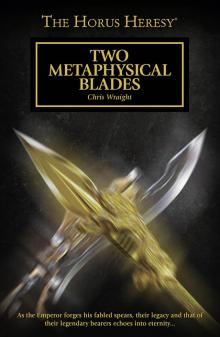 Two Metaphysical Blades
Two Metaphysical Blades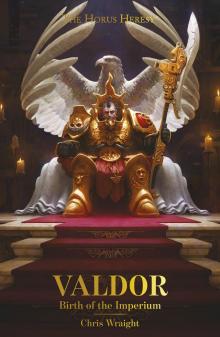 Valdor: Birth of the Imperium
Valdor: Birth of the Imperium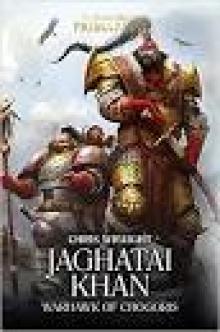 JAGHATAI KHAN WARHAWK OF CHOGORIS
JAGHATAI KHAN WARHAWK OF CHOGORIS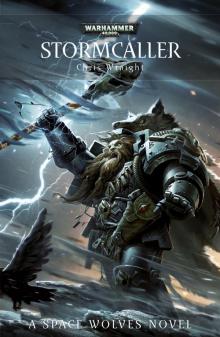 Stormcaller
Stormcaller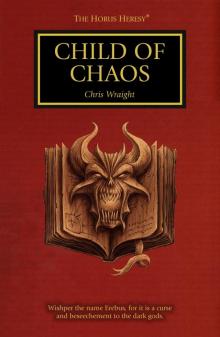 Child of Chaos
Child of Chaos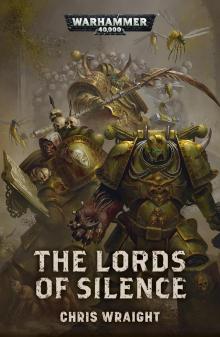 The Lords of Silence
The Lords of Silence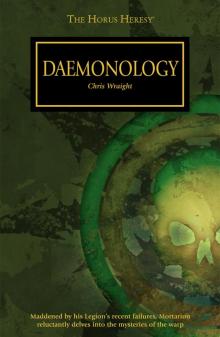 Daemonology
Daemonology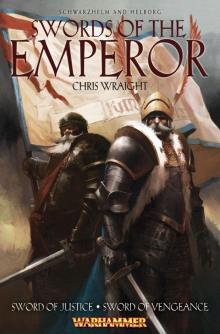 Swords of the Emperor
Swords of the Emperor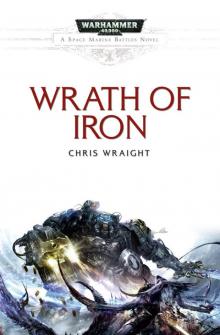 Wrath of Iron
Wrath of Iron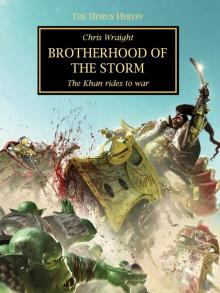 Brothers of the Storm
Brothers of the Storm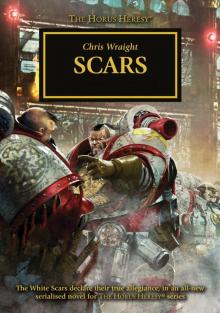 Horus Heresy: Scars
Horus Heresy: Scars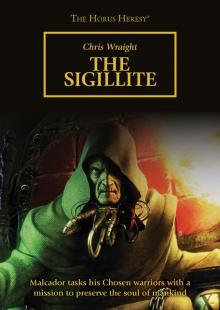 The Sigillite
The Sigillite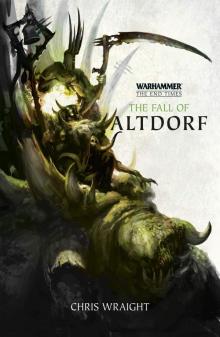 The End Times | The Fall of Altdorf
The End Times | The Fall of Altdorf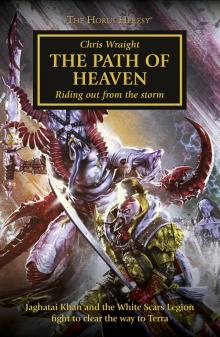 The Path of Heaven
The Path of Heaven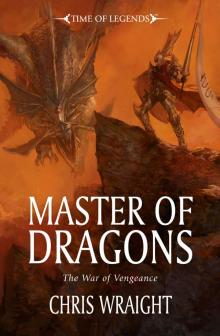 Master of Dragons
Master of Dragons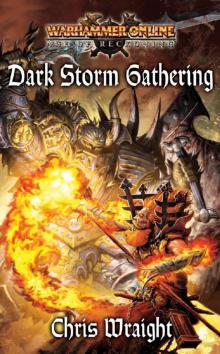 WH-Warhammer Online-Age of Reckoning 02(R)-Dark Storm Gathering
WH-Warhammer Online-Age of Reckoning 02(R)-Dark Storm Gathering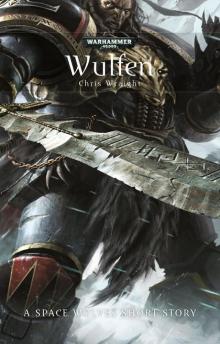 Wulfen
Wulfen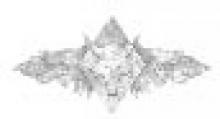 Battle Of The Fang
Battle Of The Fang Onyx
Onyx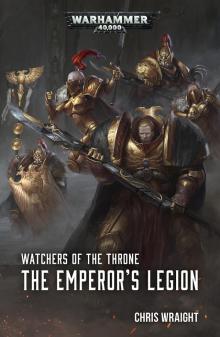 Watchers of the Throne: The Emperor’s Legion
Watchers of the Throne: The Emperor’s Legion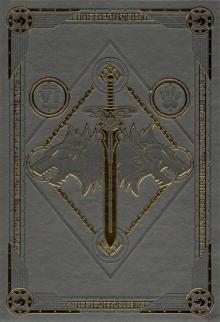 Leman Russ: The Great Wolf
Leman Russ: The Great Wolf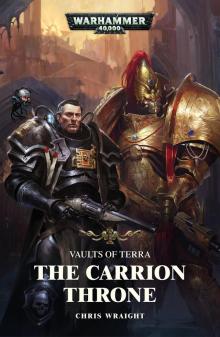 Vaults of Terra: The Carrion Throne
Vaults of Terra: The Carrion Throne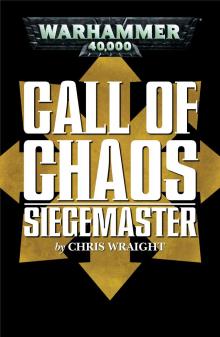 Siegemaster
Siegemaster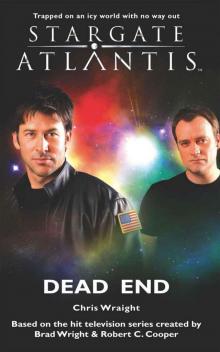 STARGATE ATLANTIS: Dead End
STARGATE ATLANTIS: Dead End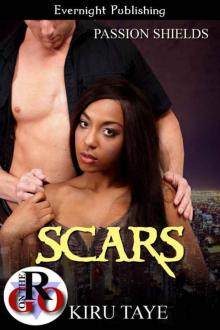 Scars
Scars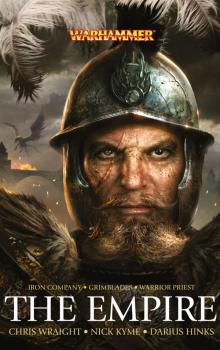 The Empire Omnibus
The Empire Omnibus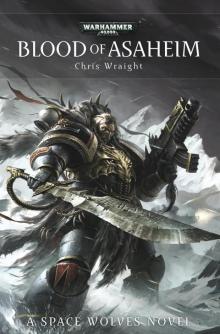 Blood of Asaheim
Blood of Asaheim